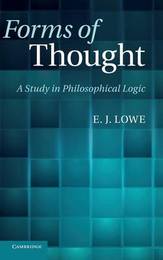
|
Forms of Thought: A Study in Philosophical Logic
Hardback
Main Details
| Title |
Forms of Thought: A Study in Philosophical Logic
|
| Authors and Contributors |
By (author) E. J. Lowe
|
| Physical Properties |
| Format:Hardback | | Pages:226 | | Dimensions(mm): Height 229,Width 152 |
|
| Category/Genre | Philosophy - logic |
|---|
| ISBN/Barcode |
9781107001251
|
| Classifications | Dewey:160 |
|---|
| Audience | | Tertiary Education (US: College) | |
|---|
| Illustrations |
1 Tables, black and white; 4 Line drawings, unspecified
|
|
Publishing Details |
| Publisher |
Cambridge University Press
|
| Imprint |
Cambridge University Press
|
| Publication Date |
11 April 2013 |
| Publication Country |
United Kingdom
|
Description
Forms of thought are involved whenever we name, describe, or identify things, and whenever we distinguish between what is, might be, or must be the case. It appears to be a distinctive feature of human thought that we can have modal thoughts, about what might be possible or necessary, and conditional thoughts, about what would or might be the case if something else were the case. Even the simplest thoughts are structured like sentences, containing referential and predicative elements, and studying these structures is the main task of philosophical logic. This clear and accessible book investigates the forms of thought, drawing out and focusing on the central logical notions of reference, predication, identity, modality and conditionality. It will be useful to students and other interested readers in epistemology and metaphysics, philosophy of mind and language, and philosophical logic.
Author Biography
E. J. Lowe is Professor of Philosophy at the University of Durham. His publications include Subjects of Experience (Cambridge, 1996), The Possibility of Metaphysics (1998), An Introduction to the Philosophy of Mind (Cambridge, 2000), The Four-Category Ontology (2006), Personal Agency (2008) and More Kinds of Being (2009). He is a General Editor of the series Cambridge Studies in Philosophy.
Reviews'Lowe aims to explicate the logical structure of thoughts via an examination of the sentences in which they are expressed ... the argumentation and explanations are clear, straightforward ... Recommended. Graduate students and researchers/faculty.' S. P. Schwartz, Choice
|